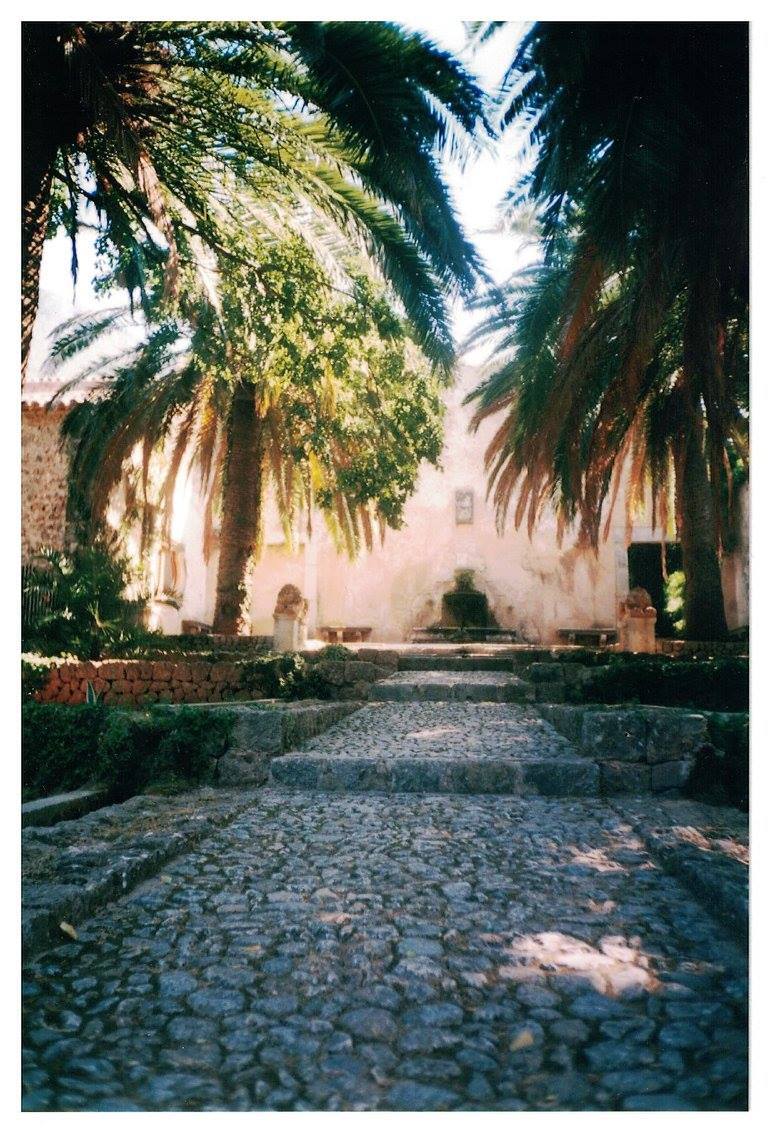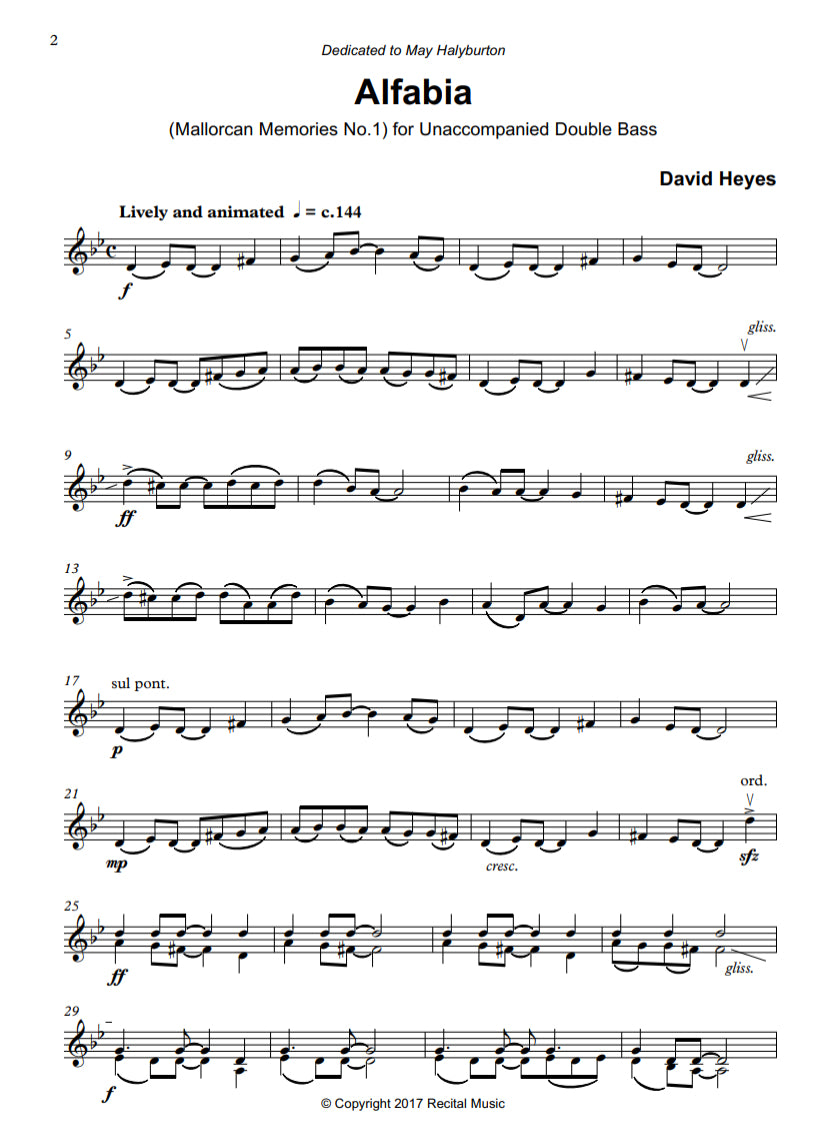David Heyes
David Heyes: Mallorcan Memories for Unaccompanied Double Bass
David Heyes: Mallorcan Memories for Unaccompanied Double Bass
Couldn't load pickup availability
Mallorcan Memories for Unaccompanied Double Bass
Three exciting, colorful, and dramatic pieces are inspired by the history, landscape, and beauty of the Spanish island of Mallorca. They can be performed singly or as a suite and each employs a number of evocative playing effects to create atmosphere, variety, and interest.
Each piece explores the different sonorities and colors of the solo double bass in music which is exotically engaging from start to finish. Mallorcan Memories is aimed at the intermediate-advanced bassist.
Table of Contents
Alfabia (Mallorcan Memories No.1) was completed on 4/5 February 2017 and is named after a beautiful old manor house and garden on the island of Mallorca.
The name Alfabia derives from 'al fabi', which means jar of olives in Arabic, and I based my piece on the D (Shahnaz) maqam, a scale using the notes D, Eb, F#, G, A, Bb, C#, D. The maqams (Arabic for position) are scales or modes in music from the Middle East and I felt this particular maqam had the correct feel to interpret this old manor house which has many architectural influences, but especially Moorish and Arabic.
Alfabia lasts around three and a half minutes and employs many playing effects, notably arco, pizzicato, sul ponticello, double stops in thumb position, col legno, and two and three-part chords alongside upper and lower drones. The maqam, with its semitones and augmented intervals, produces music of an exotic or Arabic feel and my aim was to write a piece that had great energy and momentum from start to finish. The repeat of themes and material, often changed or amended, was intentional and the final few lines build in speed and momentum until coming to a complete and sudden conclusion after such a flurry of energy and excitement.
"I love it is a great piece. Thank you for your fabulous works. I am very grateful to send me your work." [Glen Rodriguez]
"It's a fabulous piece... it is a wonderful addition to the double bass repertoire " [May Halyburton]
"Lovely melody David" [Diana Ford]
L’Alborada (Mallorcan Memories No.2) was inspired by a festival in the town of Pollensa, on the island of Mallorca, and is dedicated to Luis Guillermo Pérez in Venezuela. On 2 August each year, Pollensa celebrates the day of its patroness, Our Lady of the Angels. The inhabitants dress in white and in colours to receive their patroness and to defend their town from attack by enemy pirates in a mock battle between the Christians and the Moors. The festival begins at 5.00am when, after the street party, the band strikes up the Alborada, first performed in 1882.
L’Alborada is in two parts with slow, lyrical and Moorish-inspired melodies, interspersed with evocative strummed pizzicato chords, before the mock battle is recreated with frenzied and exciting music which pushes forward to a fast and explosive conclusion.
"I have already given several readings to LÁlborada and every time I like it more, it is under your seal of composer, I really love it. I spoke with Valentina Betancourt and she is going to premiere, she was very happy with the fact of playing the first audition in these latitudes." [Luis Guillermo Pérez]
Medina Mayurqa (Mallorcan Memories) dates from July/August 2019 and was composed for Susan Hagen in Boston (Principal Bass, Boston Pops Orchestra / Berklee College of Music). It is the slowest of the three pieces, episodic in design, and also based on the D (Shahnaz) maqam. Recurring motifs create unity and cohesion, with contrasting arco and pizzicato styles adding colour and texture, before the music slowly fades away into nothingness.
Medina Mayurqa is the Arabic name for the city currently known as Palma, the capital of Mallorca. When the Muslim conqueror Isam al-Khawlani took control of the island in 903, the old Roman city of Palma was practically abandoned and in ruins. The Muslims adapted it to their needs by building inns, baths and mosques, and although initially they partially respected the old urban layout, they quickly modified it. Today, very few visible remains of Medina Mayurqa remain although its urban layout is largely preserved. The most important remains are the old fortress, the Arab baths and the Almudaina gate.
“This piece is more gorgeous than I could have imagined!” [Susan Hagen]
“This looks awesome!!!” [P. Kellach Waddle]
Medina Mayurqa was premiered by Susan Hagen at Berklee College of Music (Boston, USA) on Tuesday 12 November 2019.
[Programme notes by David Heyes]
About the Composer
David Heyes studied double bass with Laurence Gray and Bronwen Naish, later at the Royal College of Music in London, and completed his post-graduate studies in Prague with František Pošta (Principal Bass, Czech Philharmonic Orchestra). He has given recitals and masterclasses in 20 countries over the past few years and has been a juror at a number of international competitions, three times as chairman.
David's collaborative work gained him a prestigious award from the David Walter Charitable Trust of New York for his pioneering activities as a soloist, teacher, publisher, and commissioner of new music for double bass and he works with composers throughout the world to expand the double bass repertoire by commissioning new music and by rediscovering forgotten ones. Since 1983 more than 700 works have been written for him, music from one to twenty basses and from beginner to virtuoso, and he has premiered ten contemporary concertos with orchestra.
David began to compose in 2013 and has had music performed and recorded in 27 countries across five continents. He is a D'Addario Performing Artist and has recently commissioned a solo double bass from British master-luthier Martin Penning.





